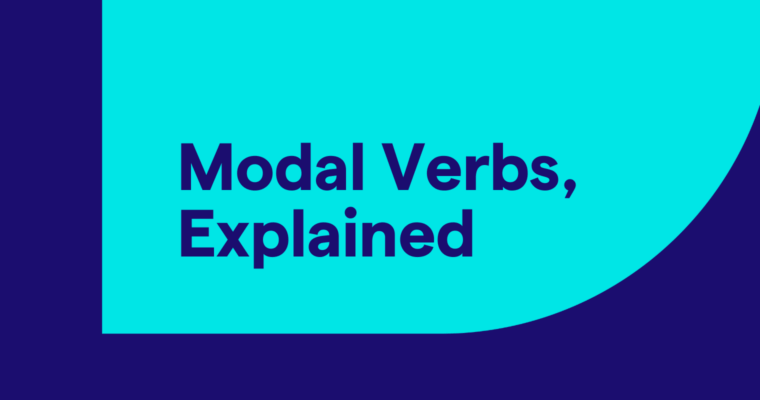
- Modal verbs are auxiliary verbs like can, should, and must that express conditions such as possibility, ability, necessity, and permission.
- Frequently used modal verbs include can, may, might, could, should, would, will, and must. Less common ones like shall and ought are still used in specific contexts.
- Modal verbs are followed by the main verb’s infinitive (without to) and remain consistent across subjects.
- In past contexts, forms like could, might, should, and would indicate hypothetical or past scenarios.
- Modal verbs are used in diverse sentence structures, such as questions (Could you help me?), suggestions (You should try the lasagna.), and habits (I would often walk to school.).
Modal verbs can be tricky, but the good news is that they’re straightforward once you learn how they work. Below, we explain everything you need to know to use modal verbs with ease.
Table of contents
When are English modal verbs used?
How to use modal verbs (with examples)
Modal verbs definition
Modal verbs show possibility, intent, ability, or necessity. Common examples of modal verbs include can, should, and must. Because they’re a type of auxiliary verb (helper verb), they’re used alongside the infinitive form of the main verb of a sentence.
Modal verbs are used to express certain hypothetical conditions, such as advisability, capability, or requests (refer to the complete list below). They’re used alongside a main verb to inflect its meaning.
Consider the difference between these two examples:
The first example is a simple factual statement. The speaker participates in a swimming activity every week on Tuesdays.
The second example uses the modal verb can. Notice how the meaning changes slightly. The speaker does not necessarily swim every Tuesday; they’re saying that they are capable of swimming every Tuesday or that the possibility exists for them to swim every Tuesday. It’s hypothetical.
Because modal verbs are auxiliary, they can’t generally be used on their own. A modal verb can appear alone in a sentence only if the main verb is implied because it has previously been established.
Can you swim every Tuesday?
Yes, I can.
Modal verbs are quite common in English; you’ve seen them in action hundreds of times, even if you didn’t know what they were called. Here are the most frequently used ones:
- can
- may
- might
- could
- should
- would
- will
- must
There are other, less common modal verbs. Some—like shall and ought—are rarely used any longer. There are also verbs that can function either as main verbs or as modal auxiliaries depending on the context: got, need, and have all behave like modal verbs in the common colloquial expressions got to, need to, and have to.
Some modal verbs express specific conditions that don’t come up often like dare in its modal form in “Dare I ask?” The word used in the idiomatic phrase used to, as in “I used to be an English student too,” behaves like a modal verb with only a past tense form.
When are English modal verbs used?
Modal verbs are used to show the following conditions: likelihood, possibility, ability, permission, request, suggestion/advice, command, obligation/necessity, and habit.
Likelihood
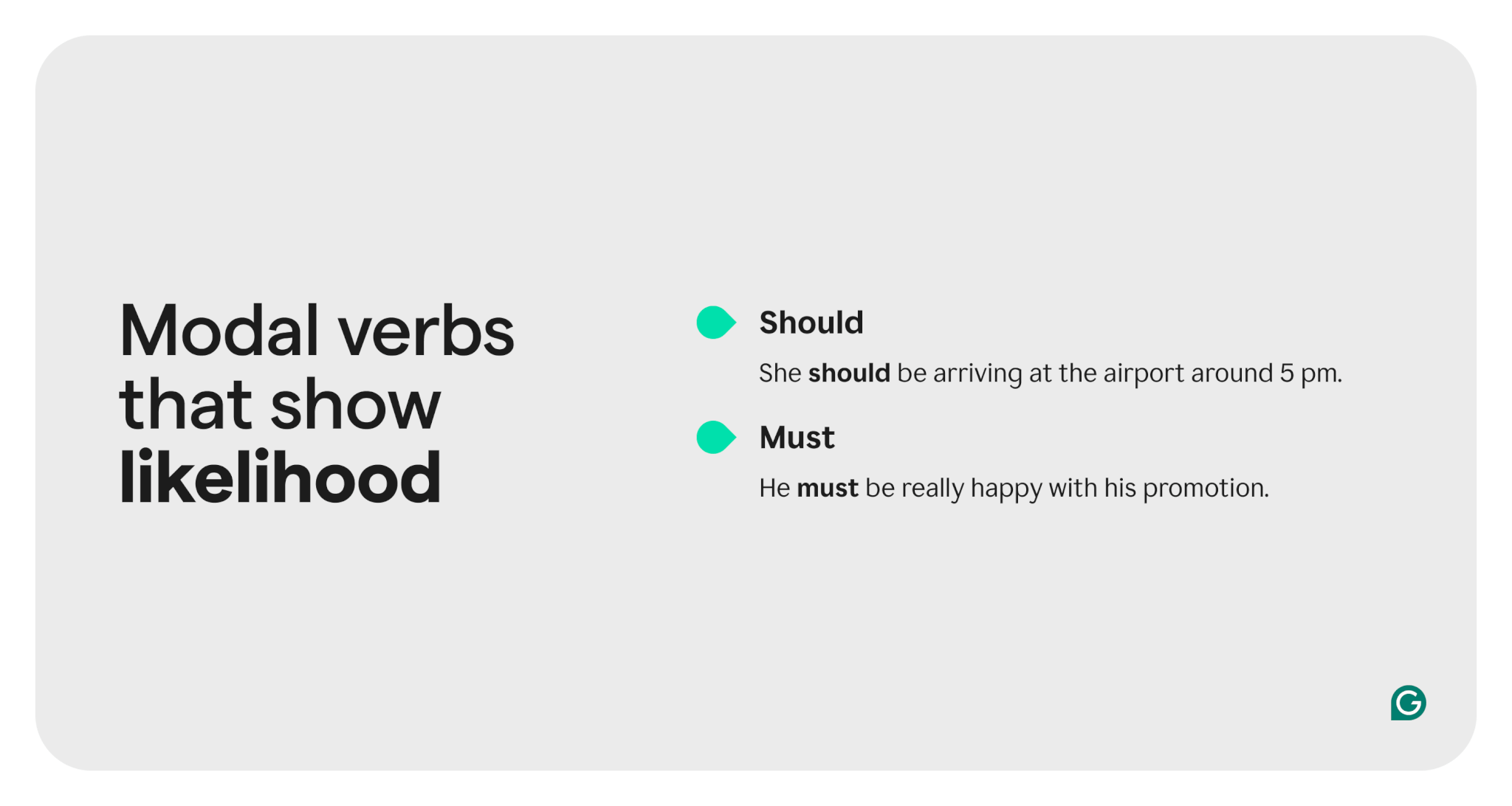
Some things seem likely to be true but can’t be stated as definite facts. In these cases, you can use the modal verbs should and must to show probability without certainty.
Possibility
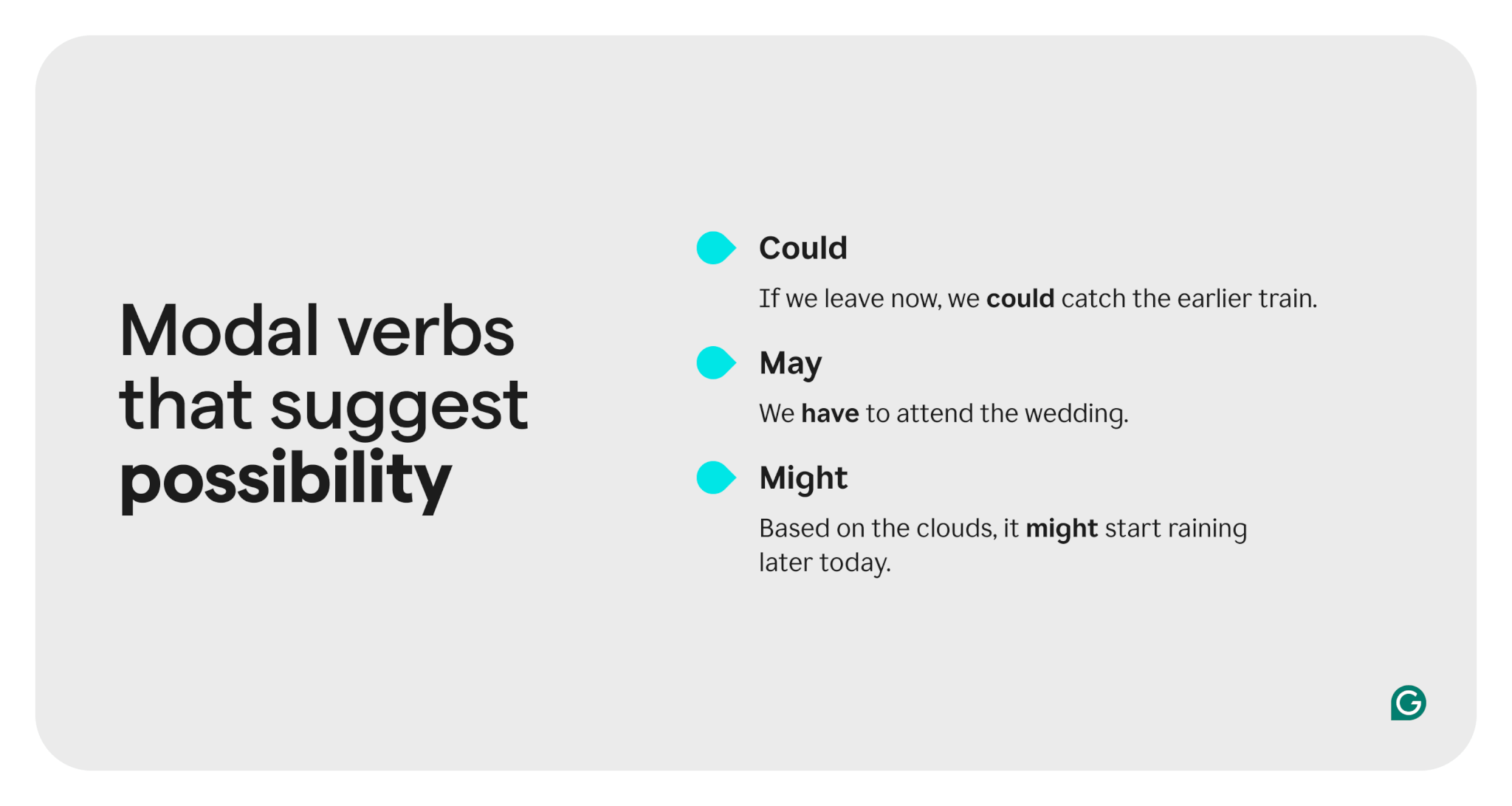
In a situation when something is possible but not certain, use the modal verb could, may, or might.
Ability
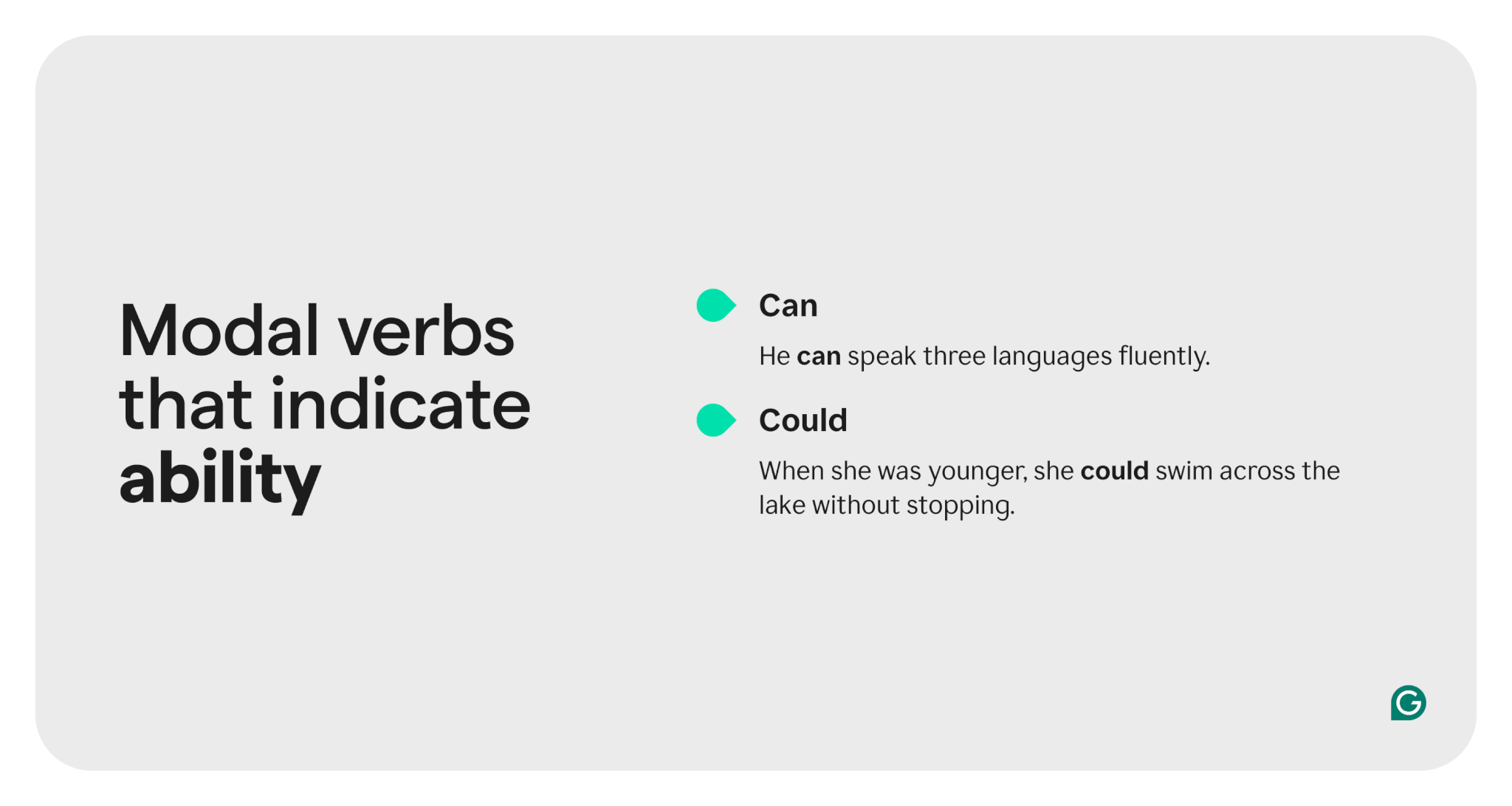
The modal verb can expresses whether the subject of a sentence is able to do something. Likewise, the negative form, cannot or can’t, shows that the subject is unable to do something.
Permission
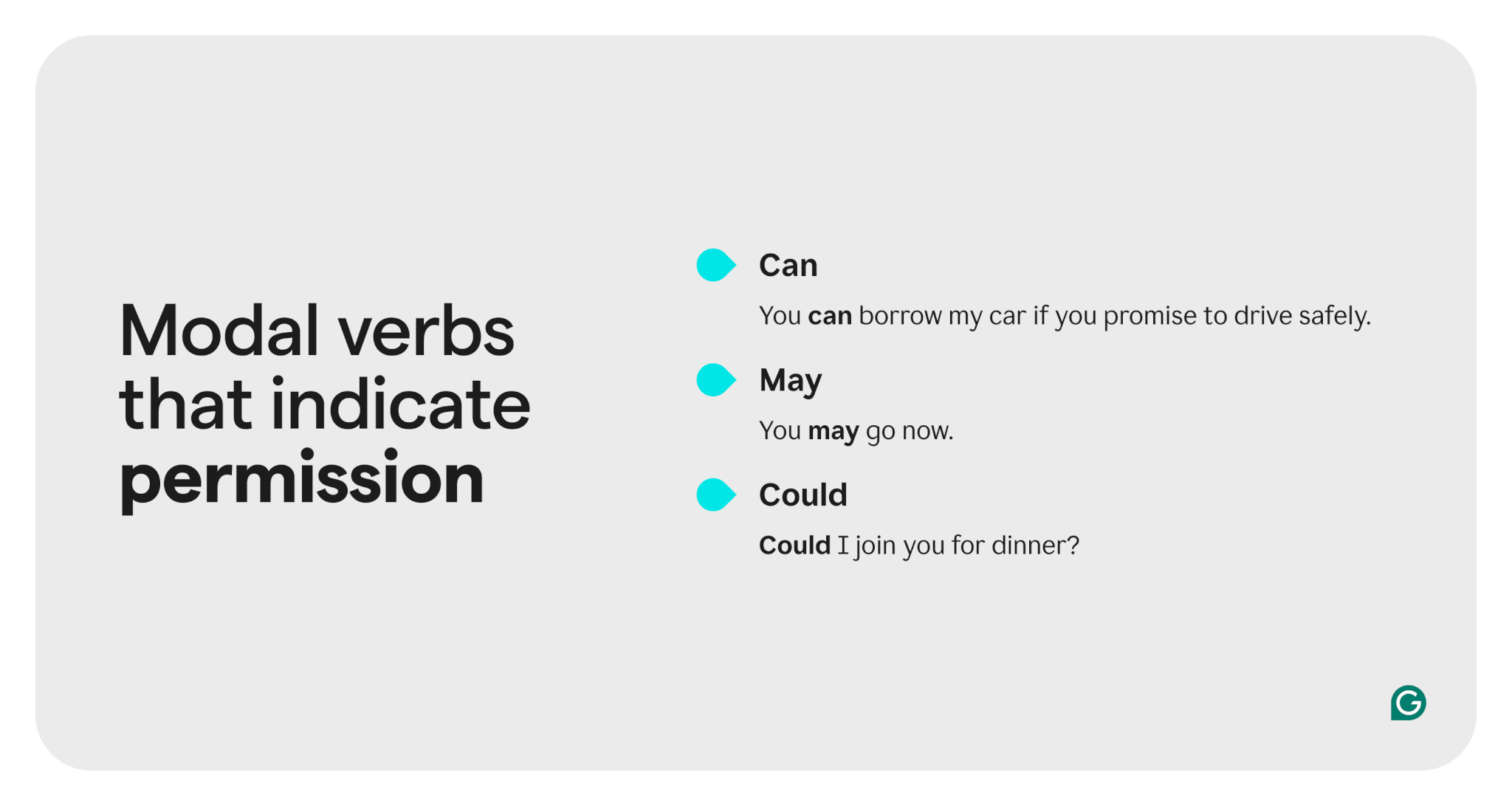
If you want to ask permission to do something, start your question with can, may, or could. Traditionally, may is considered a more formal and polite usage for permission; if you ask, “Can I go to the bathroom?” it could be misinterpreted as “Do I have the ability to go to the bathroom?” However, in modern informal usage, may and can are both perfectly acceptable options for describing possibility or permission.
Request
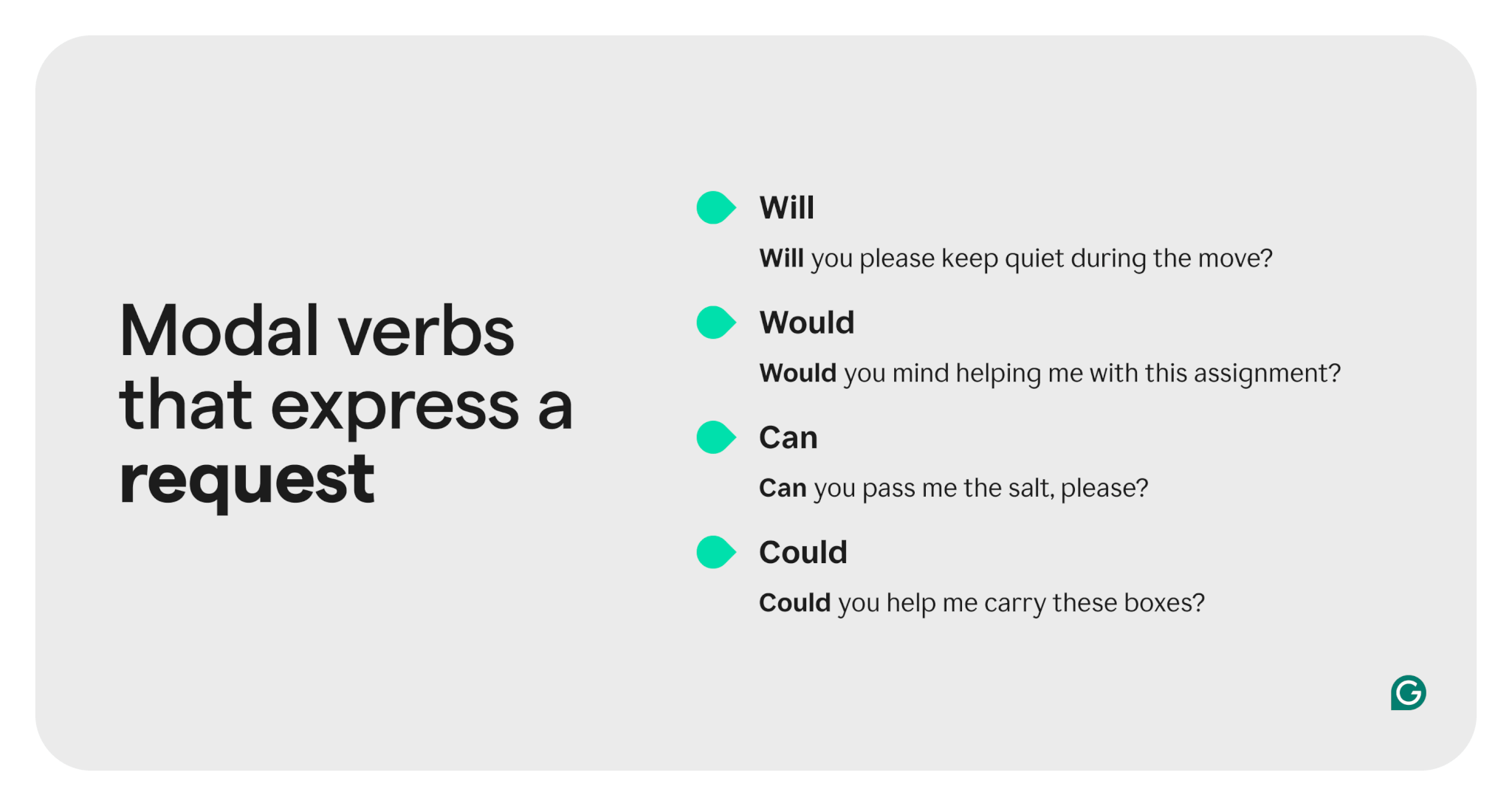
Similarly, if you want to ask someone else to do something, start your question with will, would, can, or could.
Suggestion or advice
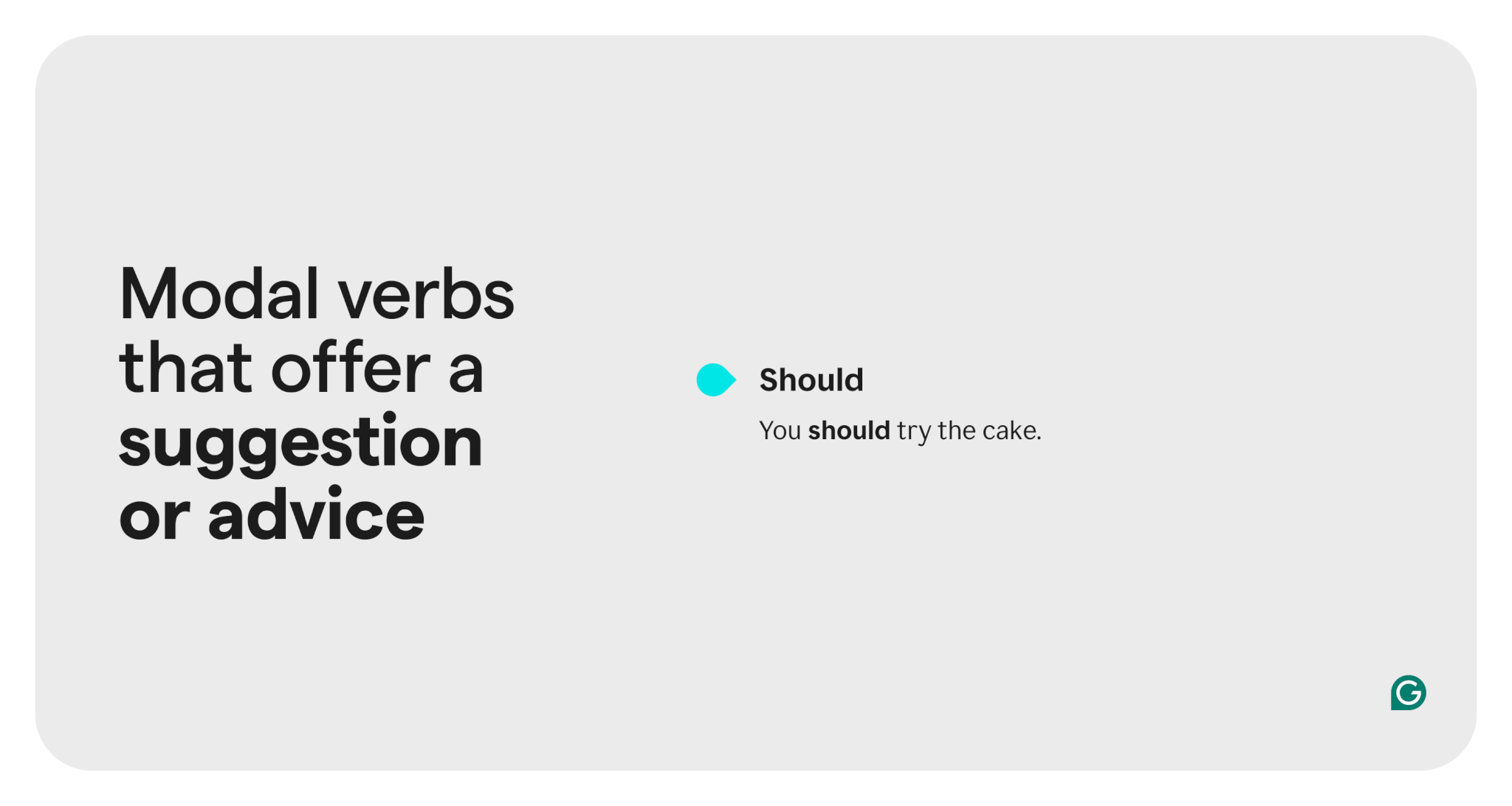
What if you want to recommend a course of action but not command it? You can use the modal verb should if you’re giving suggestions or advice without ordering someone around.
Command
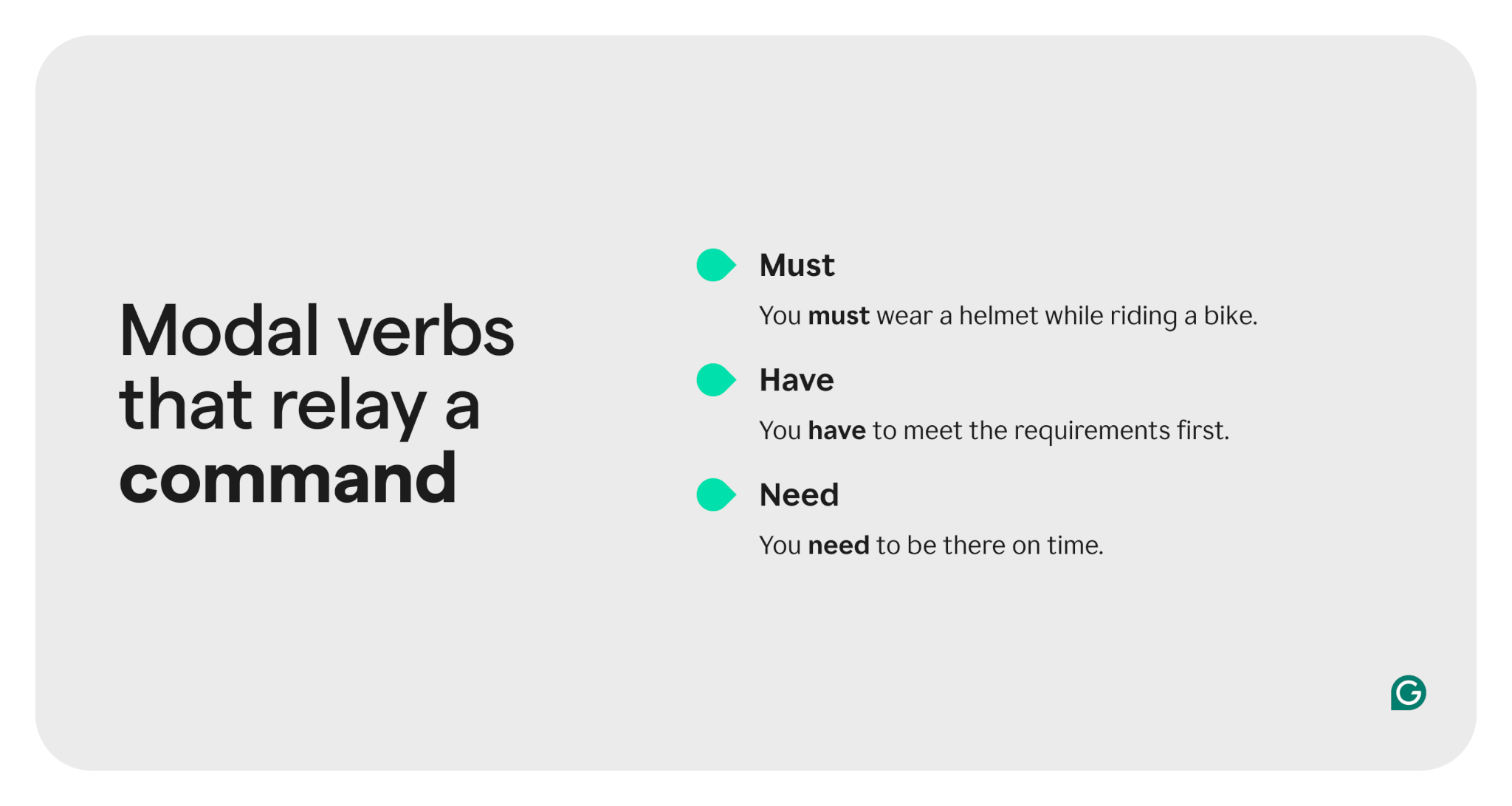
On the other hand, if you want to command someone, use the modal verbs must, have, or need. With the latter two, the main verb does not drop the word to from its infinitive form.
Obligation or necessity
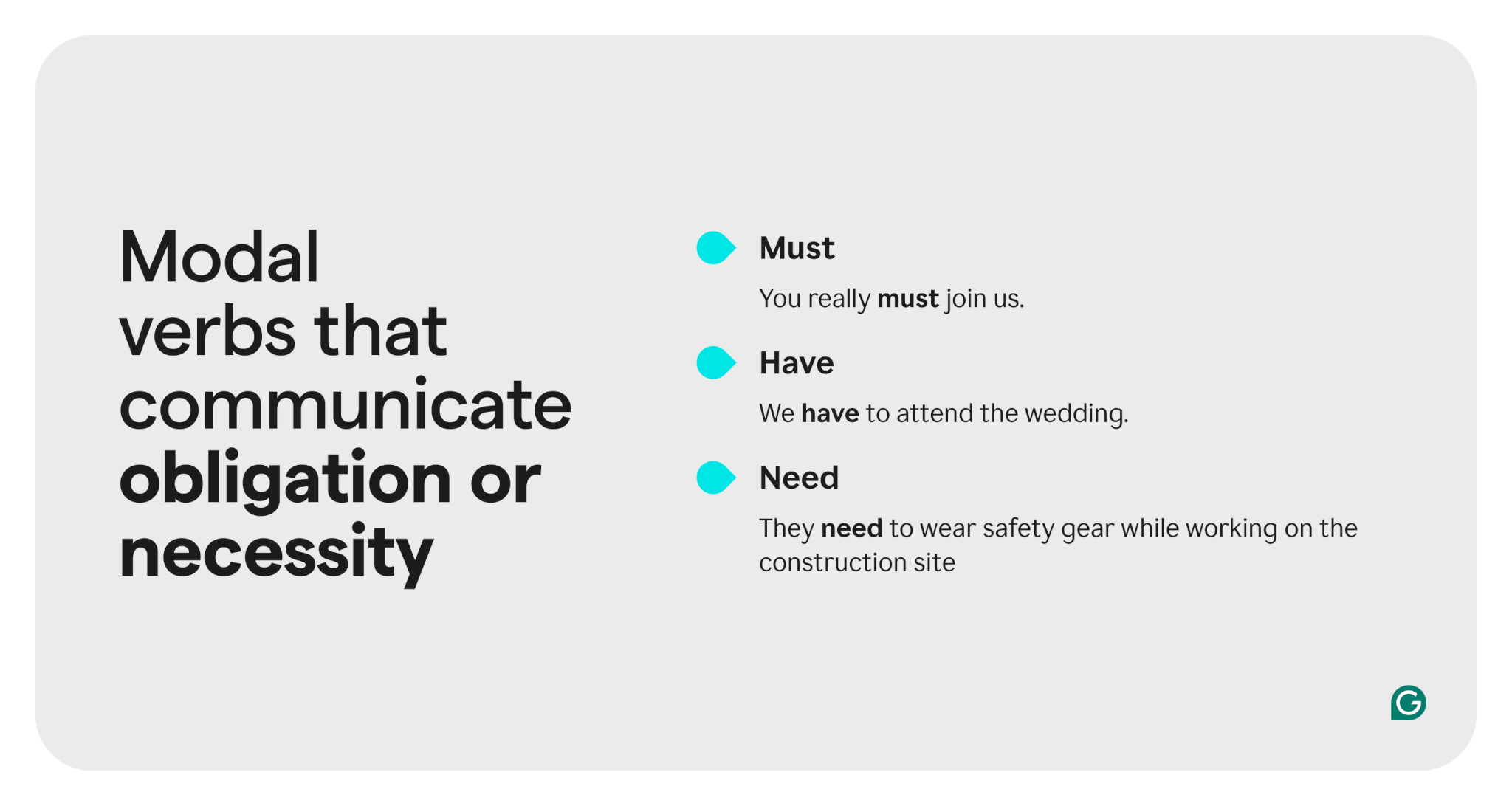
Modal verbs can express a necessary action, such as an obligation, duty, or requirement. Likewise, the negative forms express that an action is not necessary. Use the same modal verbs as with commands: must, have, and need.
Habit
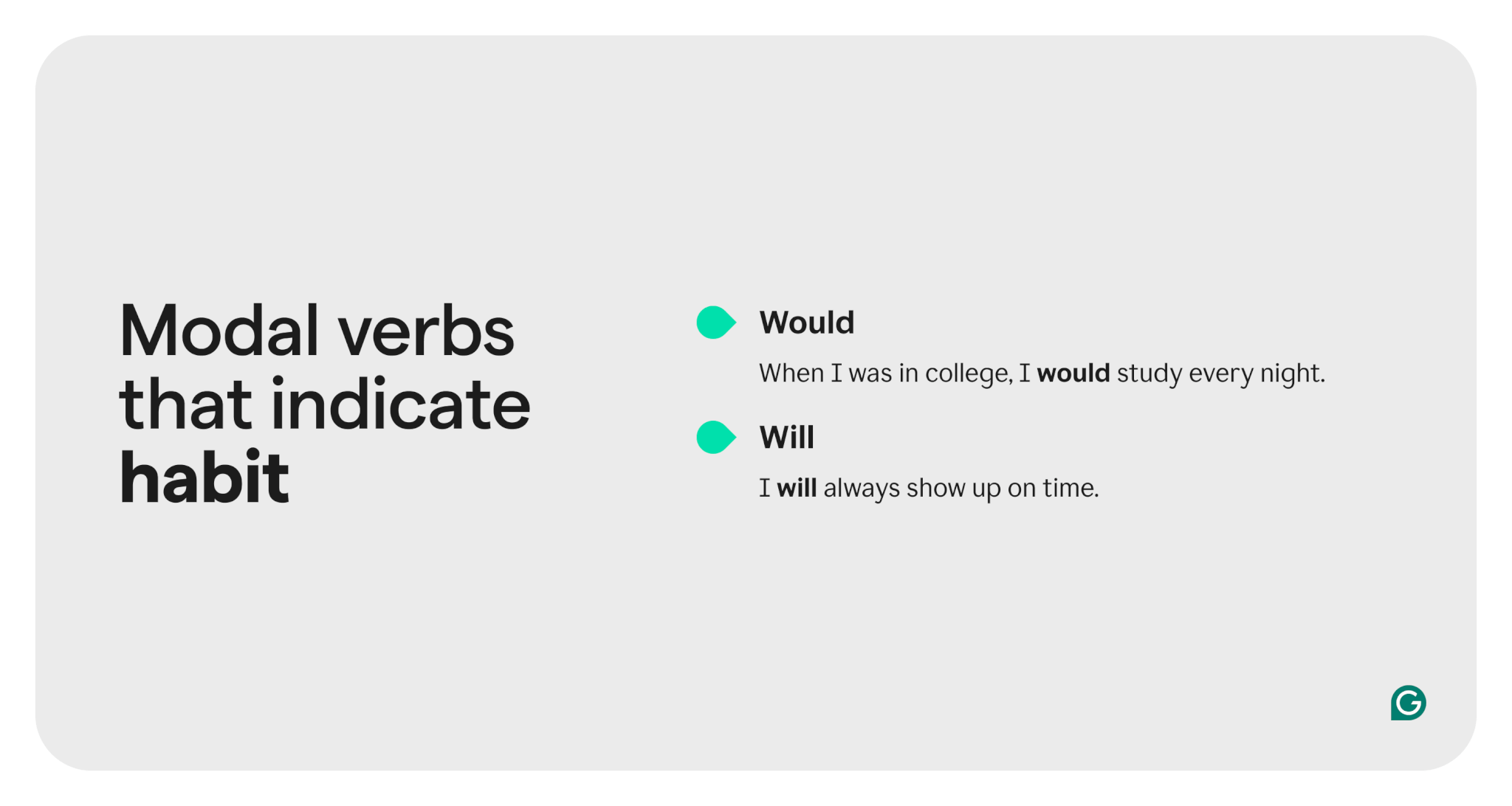
To show an ongoing or habitual action—something the subject does regularly—you can use the modal verb would for the past tense and will for the present and future. The phrase used to is also acceptable when you’re talking about a habit in the past.
How to use modal verbs (with examples)
Here’s how to use modal verbs in different tenses.
Simple present tense
For basic sentences in the simple present tense, remember these rules:
- Modal verbs come directly before the main verb except for in questions.
- With modal verbs, use the infinitive form of the main verb. With most but not all modal verbs, to is dropped from the infinitive.
So, if you want to brag about your ability to eat an entire pizza, you use the modal verb can before the infinitive form of eat without to—which is simply eat. The rest of the sentence continues as normal.
If you want to communicate that circumstances are requiring you to eat an entire pizza, you might use the modal verb have before the infinitive form of eat, retaining to:
Modal verbs in questions
For yes/no questions, you still use the infinitive form of the main verb, but the order is a little different.
The formula for modal verbs in yes/no questions is: [modal verb] + [subject] + [main verb infinitive].
Note that in the second example above, because have is a verb that only sometimes functions as an auxiliary verb and at other times functions as a main verb, the question is formed with the auxiliary verb do at the beginning.
Modal verbs and time
Because modal verbs deal largely with general situations or hypotheticals that haven’t actually happened, all of the core ones can refer to present and future time, but only some of them can refer to past time. Most of the time, they do not change form to make different tenses.
However, all of them can be used with different conjugations of a sentence’s main verb to refer to present or future time in different ways, so let’s talk a little about verb tenses and modal verbs.
Present continuous and present perfect continuous
We already covered the simple present above, but you can also use modal verbs in the present continuous and present perfect continuous tenses.
Present continuous
After the modal verb, use the word be followed by the –ing form of the main verb.
The formula for modal verbs in the present continuous is: [modal verb] + be + [verb in –ing form].
Present perfect continuous
You can add a modal verb before a main verb in the present perfect continuous tense without changing much. However, note that the main verb always forms the present perfect continuous using have been, when appearing with a modal verb, never had been, even if the subject is third-person.
The formula for modal verbs in the present perfect continuous is: [modal verb] + have been + [main verb in –ing form].
Simple past and present perfect tenses
Using a modal verb in the simple past or the present perfect (which indicates an action that happened in the past but is directly related to the present) is a little trickier.
Only a few of the core modal verbs have the ability to refer to past time: could, might, should, and would. They do this by functioning at times as the past tense forms of their fellow modal verbs can, may, shall, and will. But keep in mind that, as we saw above, could, might, should, and would also have different senses in which they refer to the present and the future, indicating possibility, permission, request, habit, or other conditions.
None of the modal verbs can be used in the past perfect, the past continuous, or the past perfect continuous tense.
Simple past
Of the main modal verbs listed at the top, only can and will can be used in the simple past. The expressions have to and need to can also be used in the simple past when conjugated as had to and needed to. Other modal verbs use the present perfect to discuss events in the past.
Can and will use their past tense form plus the infinitive form of the main verb without to, just like in the present.
The formula for modal verbs in the simple past tense is: could/would + [main verb infinitive].
Present perfect
To form the present perfect using the modal verbs could, might, should, or would, use the present perfect form of the main verb, which is have plus the past participle. As with the present perfect continuous, you always use have, even if the subject is third-person.
The formula for modal verbs in the present perfect tense is: could/might/should/would + have + [main verb past participle].
Future tenses
Because the simple future, future continuous, future perfect, and future perfect continuous tenses of main verbs are all already formed with the modal verb will, when you want to indicate likelihood, permission, or any of the other conditions discussed above in the future, it often makes sense to do it in some other way than by adding a modal verb.
However, there are also situations where a modal verb other than will can be used to discuss something in the future. In these cases, the new modal verb just replaces will in the sentence, and the main verb takes the same form it would with will.
Modal verbs FAQs
What are modal verbs?
Modal verbs are auxiliary verbs like can, should, and must that express conditions such as possibility, ability, necessity, or permission.
How are modal verbs used in sentences?
Modal verbs are followed by the infinitive form of the main verb (without to) and remain consistent across subjects. (Examples: I can drive. She must leave.)
What conditions do modal verbs express?
Modal verbs show various conditions, including:
- Likelihood: Her parents must be so proud.
- Possibility: It might rain tomorrow.
- Ability: She can swim.
- Permission: Students, you may leave early today.
- Requests: Could you help me?
- Advice: You should try the lasagna.
- Command: You must wash your hands before cooking.
- Necessity: You must finish your homework.
- Habit: I will arrive early to every meeting and leave late.
Can modal verbs refer to past events?
Yes, modal verbs like could, might, should, and would can indicate past scenarios, often paired with the present perfect form of the main verb. (Example: I should have called earlier.)
What are some less common modal verbs?
Modal verbs like shall and ought and expressions like used to or need to are less frequently used but still convey specific conditions. (Example: You ought to apply for that job.)






